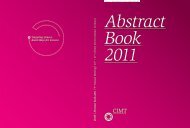Abstract Book 2010 - CIMT Annual Meeting
Abstract Book 2010 - CIMT Annual Meeting
Abstract Book 2010 - CIMT Annual Meeting
Create successful ePaper yourself
Turn your PDF publications into a flip-book with our unique Google optimized e-Paper software.
091 Ramacher | Tumor biology & interaction with the immune system<br />
Immunosuppression in transgenic mouse melanoma<br />
model induced by myeloid derived suppressor cells<br />
Marcel Ramacher 1 , Michal Baniyash 2 and Viktor Umansky 1<br />
1 German Cancer Research Center (DKFZ), Heidelberg Germany<br />
2 Lautenberg Center for General and Tumor Immunology, Jerusalem, Israel<br />
140<br />
Melanoma is known for its poor response to current<br />
immunotherapies due to immunosuppressive cells<br />
in the tumor microenvironment like myeloid derived<br />
suppressor cells (MDSC). We performed the studies<br />
on the ret transgenic mouse model of malignant<br />
melanoma, which resembles human melanoma as<br />
regards to histopathology and clinical development.<br />
After a short latency, 25% of mice develop melanoma<br />
metastasizing to lymph nodes, lungs and liver.<br />
We found that MDSC from tumor bearing mice were<br />
characterized by increased numbers and higher<br />
nitric oxide (NO) production and arginase-1 (ARG1)<br />
expression than those from tumor free mice or nontransgenic<br />
littermates. This phenomenon could be<br />
due to exosomes released by melanoma cells in<br />
vivo. In fact, upon treatment of non-transgenic littermates<br />
with melanoma derived exosomes, MDSC<br />
amounts were significantly elevated.<br />
To investigate the effect of NO and reactive oxygen<br />
species produced by MDSC on CD4+CD25- conventional<br />
(helper) T cells and CD4+CD25+ regulatory<br />
T cells (Treg), these subsets were separated from<br />
spleens and treated with NO donor DETA-NONOate<br />
or hydrogen peroxide in vitro. Both factors induced<br />
much higher apoptosis in conventional T cells than<br />
in Tregs suggesting thereby the Treg resistance<br />
to the immunosuppressive microenvironment. To<br />
reduce the MDSC immunosuppressive effect and<br />
to improve antitumor immune responses, tumor<br />
bearing mice were treated orally with an inhibitor<br />
of phosphodiesterase (PDE)-5 sildenafil (Viagra).<br />
Lower NO production and ARG1 expression in<br />
MDSC was correlated with the inhibition of melanoma<br />
progression. We suggest that an effective<br />
immunotherapy should include the inhibition of<br />
MDSC immunosuppressive functions.



